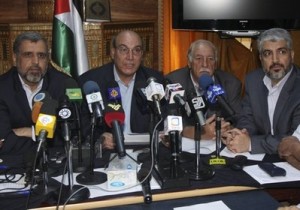 Two secular Palestinian organizations joined Hamas on Sunday in calling on President Mahmoud Abbas not to bow to U.S. pressure to resume direct peace talks with Israel, which they described as dangerous.
Two secular Palestinian organizations joined Hamas on Sunday in calling on President Mahmoud Abbas not to bow to U.S. pressure to resume direct peace talks with Israel, which they described as dangerous.
“Insisting on direct talk throws a life line to Israel as its isolation deepens,” Hamas said in a statement issued jointly after a meeting in the Syrian capital with other Palestinian organizations that included Islamic Jihad.
“A return to direct talks serves the U.S. and Zionist aim to liquidate the national rights of the Palestinian people,” the statement said.
The statement was read by Maher al-Taher, a senior official in the Popular Front for the Liberation of Palestine that does not usually toe the Hamas line.
The Democratic Front for the Liberation of Palestine, an organization which has long advocated negotiating with Israel and has a minister in the Palestinian Authority, also signed the statement.
The DFLP said direct talks cannot resume without international supervision and an end to the Gaza siege.
Hamas leader Khaled Meshaal said the meeting was “exceptional” because it brought together 11 groups that represent what he described as a majority of the Palestinians.
The schism between Hamas, which is supported by Syria and Iran, and Abbas’s U.S.-backed Palestinian authority, has weakened the Palestinian cause.
Hamas does not rule out peace talks with Israel if they realize what it considers Palestinian rights.
QUARTET
Israeli media reported that Israel has rejected a Palestinian proposal to begin face-to-face peace talks on the basis of a statement by the so called Quartet of Middle East mediators that could set a clear agenda for the negotiations.
Abbas has indicated that he could go for face-to-face negotiations, if talks were based on a March 19 statement by the four parties involved in Middle East diplomacy — the United States, European Union, Russia and United Nations.
The Quartet statement says Israel should halt settlement building in the West Bank and reach a peace agreement with the Palestinians within 24 months, creating a state on the basis of the borders that existed before the 1967 Middle East war.
U.S. President Barack Obama wants the peace process to return to the level it broke off at nearly two years ago when Israel invaded Gaza.
The densely populated area has been ruled by Hamas since it won a brief civil war in 2007 against supporters of Western-backed Abbas’s more secular Fatah faction.
Hamas had said it could live peacefully alongside Israel if Israel withdrew from all Palestinian land it occupied in the 1967 Middle East War. Hamas’s 1988 founding charter calls for the destruction of Israel and for restoration of all of British mandate Palestine. Reuters
Photo: Eleven Damascus-based opposition Palestinian groups gather in Damascus, Syria, on Sunday, August 15, 2010, to agree on a united stance towards direct negotiations between Israel and the Palestinian Authority, with from the right, Khaled Mashaal, head of Hamas politburo; Ahmed Jibril, the Popular Front for the Liberation of Palestine General Command; Maher Taher, the Popular Front for the Liberation of Palestine’s representative in Damascus; and Ramadan Shallah, the secretary general of the Islamic Jihad leade

Leave a Reply
You must be logged in to post a comment.